#islam in english literature
Explore tagged Tumblr posts
Text
Unveiling the Puzzle: Understanding Islam in Today's World

View On WordPress
#1st prophet of islam#1st rasool of islam#2nd nabi of islam#2nd prophet of islam#3 fundamental principles of islam#4 scholars of islam#5 rules of islam religion#6th pillar of islam#7 beliefs of islam#about islam in english#did islam come from ishmael#dr yasir qadhi yazid#english lecture on islam#english talk about islam#english with m islam#explaining quran in english#explanation of islam religion#explanation of quran in english#first holy book of islam#history of islam english#history of quran in english#how did muhammad spread islam#information about islam in english#islam explained in english#islam from the beginning#islam in english literature#islam information in english#islam religion in english#islam rules and regulations#islam teaching in english
0 notes
Text
I’m in love with this quote;
“Don’t set limits on your dua because you’re praying to One without limits. Pray big.”
#duadaily#du'a#english literature#islamicquotes#islamicreminders#islamic life#islam#islamicpost#reminder#daily reminder#shukar#sayings#desiblr#aesthetics#allah is kabir#allahisone#allah#دعاء#اللہ#zikr#praying#prayer#tahajud#tawakkul#trust in allah#trust the process#writerblr#writer and poets#fajr#adhkar
793 notes
·
View notes
Text
I wish I could show you when you are lonely or in darkness the astonishing light of your own being.
Hafiz of Shiraz
#hafiz#Persia#words#Sufi#Sufism#Islamic#Iranian#Persian#Iran#hippy#light#soul#radiance#darkness#poetry#poem#word#literature#English#quote of the day#love
21 notes
·
View notes
Text
“Fear not the future, weep not for the past.”
— Percy Shelley, Laon and Cythna; or, The Revolution of the Golden City: A Vision of the Nineteenth Century (1817).
#literature#english literature#percy shelley#percy bysshe shelley#the revolt of islam#laon and cyntha#poem#poetry#poets#romanticism#the romantics#romantic poetry#quotes#inspiring#inspirational#hope#hopepunk#positivity#solarpunk
23 notes
·
View notes
Text




thrifted bookish finds 1.may.24
i've discovered that i've missed out on so much by ignoring those uncomfortably large non-fiction books that crowd the bottom of every bookshelf. found a book on Islamic architecture and two nature books with the most adorable illustrations which I'll be posting pics of in the coming days.
> Monuments of Civilisation: Islam by Umberto Scerrato - middle eastern history, north african history, islamic history, history, architecture, non-fiction. > Nature Diary by Janet Marsh - memoir, nature, art, non-fiction. > Still Glides the Stream by Flora Thompson - historical fiction, literary fiction, British fiction, classic.
#books#dark academia#reading#light academia#literature#academia#lit#classic academia#bookblr#nejj bookblr#bookish#booklr#book blog#book recommendations#book haul#fiction#english literature#photography#nature#islam
34 notes
·
View notes
Text
How I planned the year 2024 🌷🪐💌🥂
1. Splitting the year into 4 quarters
2. Having monthy goals and quarterly goals
3. Using Eisenhower Matrix
4. Planning financial savings per quater
5. Planning charity fund per quarter
6. 101 goals for the year
7. Writing down the five year plan and working towards it.
8. Being faith & purpose driven
9. Achieving the 8 dimensions of wellness
10. Bullet journaling
Habits I'll be taking into 2024 🌷
1. Having breakfast everyday
2. Cleaning my room at night before bed.
3. Bullet journaling
4. Keeping a small notebook with me at all times to write down random thoughts.
5. Listening to a podcast while doing chores
6. Deep cleaning once a week
7. Notifications OFF
8. Protecting my energy
9. Using a calendar to mark off goals every day
10. Setting up my notion
11. Starting the morning with warm lemon water
12. Maintaining a morning ritual
13. Weekly skincare duties
14. Multitasking when i can
15. Managing my energy and time
16. 3L water with a pinch of salt everyday adds back the electrolytes you need
17. Planning the next day at night
18. Writing down major goals for the next week on the weekend
19. Planning solo dates
20. Journaling
21. Reading
22. Prepping my meals so I don't feel lazy and skip them
23. Investing in myself
24. Taking one day to complete all the work and the next day for break
25. Enjoying what I do
Habits I won't be taking into 2024 🌷
1. Negative self talk
2. Skipping meals
3. No enough protein intake
4. Too much coffee
5. Letting my mood affect my work
6. Thinking what people think about me has to do anything with me at all
#self help#self improvement#self care#self love#love#productivity#thewizardliz#2024 is my year#new year#tumblr#books are the best#cats and books#coffee and reading#islamic teachings#planets#plants#chaotic academia#light academia#english literature#chaotic aesthetic#cute cats#love me love my voice
28 notes
·
View notes
Text
The digital age has opened a treasure trove of opportunities to earn money from the comfort of your own home.expand_more

#digital art#digital painting#english literature#how to earn money#how to help#how to manifest#how to train your dragon#how to convert to islam
1 note
·
View note
Text

Mother's Embrace by ItratRasool ✨
#mother's Embrace by ItratRasool#itratrasool#mother's day#mother love#islamic path786#sultan of the months#follow for more#islamic#ramadan#duaa#follow me#islam#islamification#follow#english literature#post colonialism
1 note
·
View note
Text
Unveiling the Puzzle: Understanding Islam in Today's World

View On WordPress
#1st prophet of islam#1st rasool of islam#2nd nabi of islam#2nd prophet of islam#3 fundamental principles of islam#4 scholars of islam#5 rules of islam religion#6th pillar of islam#7 beliefs of islam#about islam in english#did islam come from ishmael#dr yasir qadhi yazid#english lecture on islam#english talk about islam#english with m islam#explaining quran in english#explanation of islam religion#explanation of quran in english#first holy book of islam#history of islam english#history of quran in english#how did muhammad spread islam#information about islam in english#islam explained in english#islam from the beginning#islam in english literature#islam information in english#islam religion in english#islam rules and regulations#islam teaching in english
0 notes
Text
From Gaza to Europe: A Young Girl's Dream is Finally Coming True!
Vetted by association (Mahmoud khalaf) here.
Before the genocidal war on Gaza, I was immersed in university life and enjoyed studying English literature at the Islamic University in Gaza (IUG), which was utterly destroyed by Isr*ael. They destroyed the place that helped me find my passion: performing on stage in English.
youtube
My family and I have been displaced multiple times and we ended up now in a tent that does not protect us from any bullets, shrapnel, or the cold and rain of winter. I had never thought I would have to live in such hellish conditions at the age of 20, an age at which I was expecting to be studying at university and enjoying the company of my friends like any other girls my age around the world!!!
youtube


Below is my letter of acceptance from Mary Immaculate College (MIC) in Ireland, the place where I am reclaiming and achieving my dreams.
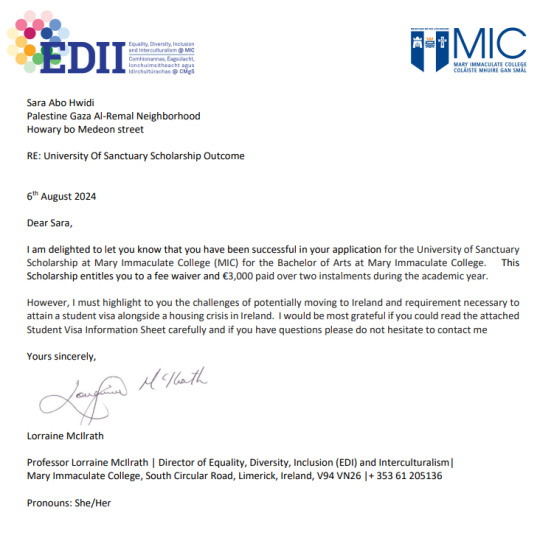
Amid the pain, horrors of war and many near death experiences, luckily, I was awarded a scholarship to do a BA in English Language and Literature at Mary Immaculate College in Ireland. A glimmer of hope shone in my sky, happiness rushed strongly through my veins, and a voice within me roared: "A unique destiny awaits you, Sarah. Seize this opportunity, honor your people abroad, and use your talent to tell the world about Palestine and touch their hearts."
Read more about the scholarship here.
I am literally at a crossroads at this stage in my life. I could keep running from a place to another with my family searching for safety and wasting years of my life without education. Or, you could help me evacuate with my family to Egypt and then go to study at Mary Immaculate College in Ireland.
Please do NOT decide to look away and send my only opportunity for a good education to go with the winds. Please boost my campaign by:
donating, reblogging and sharing.

@fivetrench @nogender-onlystars @thefrogmanmpp
@a-shade-of-blue @s1x-foot-deep @inolongerknowwhatimdoing
@kordeliiius @secondary-objective-active @mavigator
@lun4rc0w @selamat-linting @dude-iloveu
@jesncin @estrellasrojas @loveaankilaq @ddeck
@time-was-over @possum-with-a-banjo @buttercuparry
@mar64ds @blossomdapple @mothfishing
@alexander-the-alright @sixty-silver-wishes
@newporters @punkitt-is-here @ethereal-night-fairy
@rainintothesea @madocactus @queen-erika-the-songful
@kathles
@fancysmudges @brokenbackmountain @mothblossoms
@aleciosun @fluoresensitive @khizuo @lesbiandardevil
@transmutationisms @schoolhater @timogsilangan @appsa
@buttercuparry @sayruq @sar-soor @akajustmerry
@annoyingloudmicrowavecultist @feluka @tortiefrancis
@flower-tea-fairies @tsaricides @riding-with-the-wild-hunt
@brutaliakhoa @raelyn-dreams @troythecatfish @theropoda
@tamarrud @4ft10tvlandfangirl @queerstudiesnatural
@northgazaupdates2 @baby-girl-aaron-dessner @nabulsi @sygol
@junglejim4322 @heritageposts @chososhairbuns @palistani
@imjustheretotrytohelp @ibtisams @vakarians-babe @90-ghost
@fairuzfan @humanvoicebox @plomegranate @queerstudiesnatural
@stil-lindigo @soon-palestine @communistchilchuck @ghost-and-a-half
@rebecca-levin-art @mangocheesecakes @transmutationisms
#Sarah from Gaza#vetted#Verified#vetted by association#mahmoud khalaf#gaza#all eyes on gaza#news on gaza#gaza fundraiser#gaza genocide#gaza strip#free gaza#gazaunderattack#free palestine#falastine ask#palestinian genocide#save palestine#i stand with palestine#all eyes on palestine#save gaza#mutual aid#!!!#rb#signal boost#Pales#Youtube
4K notes
·
View notes
Note
How many languages do you speak?
You are always talking about alchemist that lived all around the world in very differente time periods. And you have mentioned several times that there's a ton of numerology hidden in their texts, counting syllables and letters of certain words and paragraphs. So one would assume you need to read them in the original language it was written, right?
That's a really good question! As with most really good questions, the answer is "kinda, it depends!"
So! Most alchemical texts are written in some form of coded language, but the nature of that code depends on the era and culture the text is being written in. Depending on how its written, modern scholars have a lot of different tools for cracking open alchemical esoterica.
Most ancient Greek/Byzantine texts are written in postclassical Greek. But, they're often written in dense philosophical prose. The reader needs to be familiar with the likes of Plato, Aristotle, and the early Neoplatonists, to make sense of them. Luckily for us, people have been studying postclassical Greek for nearly 2000 years. There are many excellent translations into English.
Late Egyptian alchemists wrote almost entirely in pictograph code. Not as in hieroglyphics, mind you. Egyptian alchemical recipes often made use of custom character sets and symbols that represented alchemical concepts. (One famous example, the Formula of the Crab, uses a complex diagram that looks like a centipede to represent a particular gold compound.) These are damn near impossible to read without expert help.
At the same time, Jewish and Syriac writers of the era could get by on the fact that not everyone could read Hebrew and Syriac lol. The language barrier itself acted as a sort of copyright system for protecting their ideas. Luckily for us, many of these texts were preserved and translated by medieval Arab scholars!
Speaking of Arabic, once you hit the Islamic Golden Age, the amount of alchemical literature increases by a factor of ten. Thing is, the Islamic Polymaths weren't all that interested in obscuring their work. The Islamic Golden Age was all about copying and translating older works, and compiling them into big textbook/dictionaries. They're not intentionally encoded, they're comparatively easy to read once you get a good translation. Thing is, you gotta know your Neoplatonism. Medieval Islamicate scholars love Neoplatonism.
Then we get the reintroduction of alchemy to Europe around the 10th century. What you get is about 400 years of monks painstakingly translating medieval Arabic into Latin. A lot of these texts are very well preserved, and have good translations into English.
Then, around the late 14th century, European entrepreneurial alchemy kicks into high gear, and THIS is where we get all those fancy numerology encoded alchemical texts. Renaissance alchemists loved themselves some puzzles. This would be fine if they were all just writing in Latin, but the printing press meant they could write in any damn language they please. You get a lot of French, German, Dutch, Italian, and antiquated English alchemical texts, and they can be a bitch to read without help.
BUT the introduction of the printing press also gave us something useful: cheap picture books! Late renaissance alchemists loved writing in word games and coded metaphor, but they also loved including esoteric diagrams. And the thing about esoteric diagrams is --if you know your stuff-- you don't need to speak 15th century french to read a picture. Which isn't a replacement for reading the original translation, not even close, but the explicit purpose of these images was to prove to other alchemists that the author knows what they're talking about. So if you can read them, you can get a damn good sense as to what the text is about.
This was fun to write so I'm gonna plug my patreon if you wanna see me write more about alchemy.
2K notes
·
View notes
Text
Excerpt from Percy Shelley's eighth canto of The Revolt of Islam (1818):
"O Love, who to the hearts of wandering men Art as the calm to Ocean's weary waves! Justice, or Truth, or Joy! those only can From slavery and religion's labyrinth caves Guide us, as one clear star the seaman saves. To give to all an equal share of good, To track the steps of Freedom, though through graves She pass, to suffer all in patient mood, To weep for crime, though stained with thy friend's dearest blood, —
To feel the peace of self-contentment's lot, To own all sympathies, and outrage none, And in the inmost bowers of sense and thought, Until life's sunny day is quite gone down, To sit and smile with Joy, or, not alone, To kiss salt tears from the worn cheek of Woe; To live, as if to love and live were one, — This is not faith or law, nor those who bow To thrones on Heaven or Earth, such destiny may know.
But children near their parents tremble now, Because they must obey — one rules another, And as one Power rules both high and low, So man is made the captive of his brother, And Hate is throned on high with Fear her mother, Above the Highest — and those fountain-cells, Whence love yet flowed when faith had choked all other, Are darkened — Woman as the bond-slave dwells Of man, a slave; and life is poisoned in its wells.
Man seeks for gold in mines, that he may weave A lasting chain for his own slavery; — In fear and restless care that he may live He toils for others, who must ever be The joyless thralls of like captivity; He murders, for his chiefs delight in ruin; He builds the altar, that its idol's fee May be his very blood; he is pursuing — O, blind and willing wretch! — his own obscure undoing.
Woman! — she is his slave, she has become A thing I weep to speak — the child of scorn, The outcast of a desolated home; Falsehood, and fear, and toil, like waves have worn Channels upon her cheek, which smiles adorn, As calm decks the false Ocean: — well ye know What Woman is, for none of Woman born Can choose but drain the bitter dregs of woe, Which ever from the oppressed to the oppressors flow.
This need not be; ye might arise, and will That gold should lose its power, and thrones their glory; That love, which none may bind, be free to fill The world, like light; and evil faith, grown hoary With crime, be quenched and die. — Yon promontory Even now eclipses the descending moon! — Dungeons and palaces are transitory — High temples fade like vapour — Man alone Remains, whose will has power when all beside is gone.
Let all be free and equal! — From your hearts I feel an echo; through my inmost frame Like sweetest sound, seeking its mate, it darts — Whence come ye, friends? Alas, I cannot name All that I read of sorrow, toil, and shame, On your worn faces; as in legends old Which make immortal the disastrous fame Of conquerors and impostors false and bold, The discord of your hearts, I in your looks behold."
#literature#english literature#romanticism#percy shelley#poetry#dark academia#aesthetic#history#percy bysshe shelley#shelley#world poetry day#the revolt of islam#laon and cythna
14 notes
·
View notes
Text
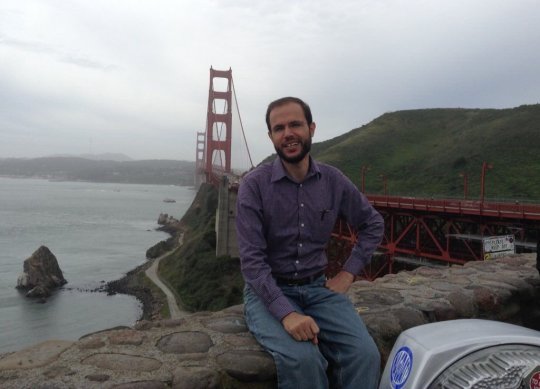
➡️Today I am starting the We Are Not Numbers initiative to commemorate the martyrs.
Let's publish the stories of the martyrs. Please reblog the post
If I must die
you must live
to tell my story
Dr. Refaat Alareer (September 23, 1979 – December 6, 2023)
He is a Palestinian academic, writer and poet from the Gaza Strip, and is called by some the “pioneer of the English language.” He teaches literature and creative writing at the Islamic University of Gaza, and co-founded the We Are Not Numbers project, which aims to address the suffering of Gazans in the aftermath of the 2023 Israeli-Palestinian war, and which pairs Gazan authors with mentors abroad to help them write stories about their reality in English.

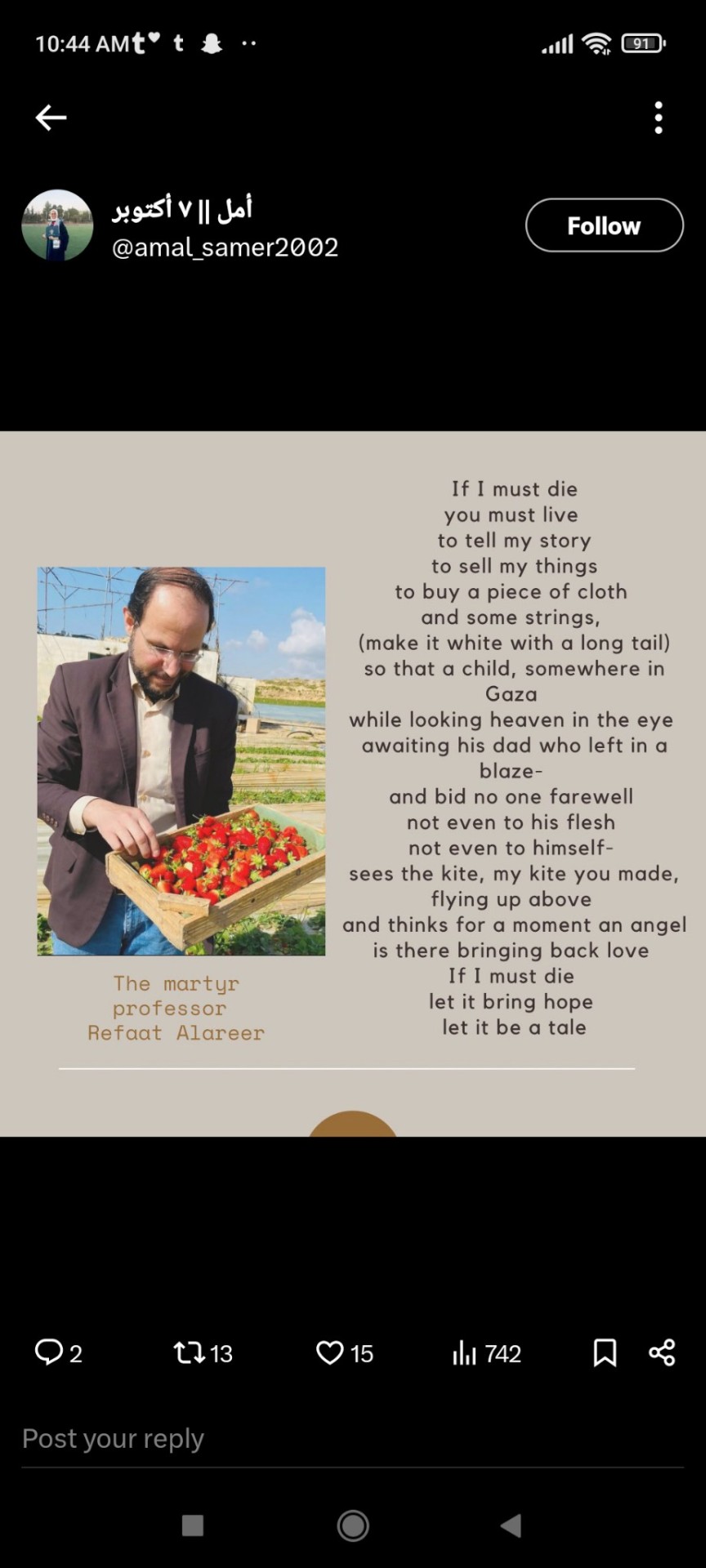
Refaat was committed to his mission of teaching and passing on his knowledge to the rising generations. He believed that education is one of the most powerful weapons in the face of the occupation. He was not just a university professor, but an inspiration to students, encouraging them to explore science and develop their skills to build a better future. He dedicated his time and knowledge to serving Palestine, and took it upon himself to work on research projects that could contribute to improving the situation within the Strip, despite the great challenges he faced
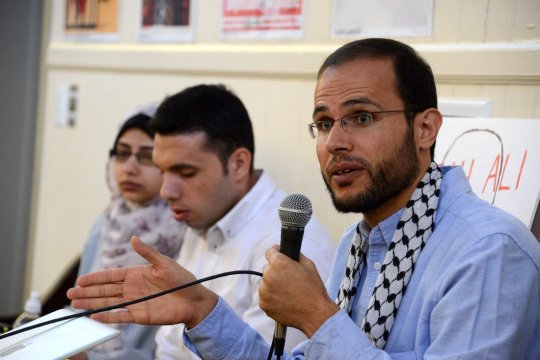
He had announced his refusal to leave northern Gaza days after the Israeli ground response to the 2023 Palestinian-Israeli war. He had published a widely circulated poem on the X platform entitled “If I Must Die,” concluding it with the words: “Let it inspire hope, let it be a story.”
youtube
Refaat and his family were killed on December 6, 2023, during an Israeli airstrike on his sister’s home in northern Gaza. His brother, sister, and four children were also killed in the bombing, during the Israeli response to the 2023 Palestinian-Israeli war.
His friend Asem al-Nabih, a member of the Gaza Municipality’s Emergency Committee, who was with him for many days of the war and until the last hour before he was targeted, mourned him and described him as a source of ideas and a real human being. Later, on April 26, 2024, Israel assassinated his daughter Shaima, along with her husband and three-month-old infant.

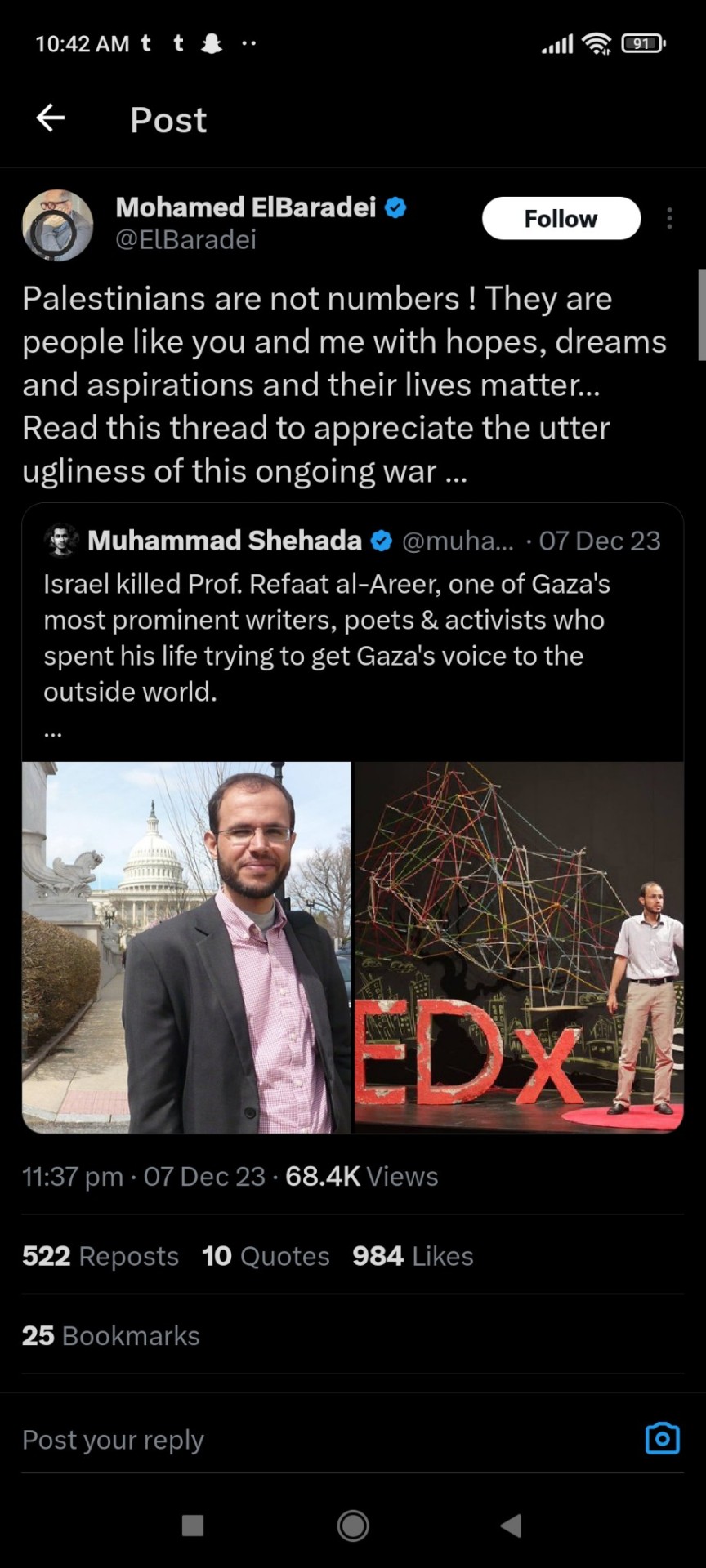
@fancysmudges @brokenbackmountain @aleciosun @fluoresensitivearchived @khizuo @schoolhater @timogsilangan @appsa @buttercuparry @sayruq @malcriada @palestinegenocide @sar-soor @akajustmerry @annoyingloudmicrowavecultist @feluka @tortiefrancis @flower-tea-fairies @tsaricides @riding-with-the-wild-hunt @visenyasdragon @belleandsaintsebastian @ear-motif @kordeliiius @brutaliakent @raelyn-dreams @troythecatfish @theropoda @tamarrud @4ft10tvlandfangirl @queerstudiesnatural @northgazaupdates2 @skatezophrenic @awetistic-things @camgirlpanopticon @baby-girl-aaron-dessner @nabulsi @sygol @junglejim4322 @heritageposts @chososhairbuns @palistani @dlxxv-vetted-donations @imjustheretotrytohelp
405 notes
·
View notes
Text
Hot Take Incoming The more I read about Neo/New Bundism, the more I'm convinced that it's an ideology that is based on a weird mix of Ashkenazic white guilt, "yearning for the shtetl", and identifying with Yiddish culture over Jewish culture because the former emphasizes secularism while the latter does not (which belies that fact that Judaism has multiple ways to engage with it and you don't need to be religious).
This last part is especially important to understand as in the West, Judaism is emphasized as one of the Big Three religions even though it's one of the smallest in the world. Many of us are taught that Judaism is just proto Xtianity or Islam, and depending on where you live and your community you absorb that. Especially if your family is non-practicing and there isn't much of a Jewish community and culture for you to interact with growing up. Many of our holidays, cultural norms, and so on are associated with Xtianity and framed in regards to a Cultural Xtian society. Hence why I think so many young secular Jews feel that they can't actually connect with Judaism because the narrative they have from Xtian society plus their disconnect from Jewish society means they perceive Judaism through the Xtian religious perspective.
If Cultural, religious, and lax Xtians are this way, then sure Judaism is as well since Xtianity is based on it, right?
That's the mindset I've seen over and over.
This is further exacerbated by the immigrant communities in the North Eastern USA (NY, PA, NJ) that had massive moments of cultural exchange and assimilation. Deli culture in the North East is a mix of Italian and Jewish cultures. Historically, Italian and Jewish communities allied and mixed in the early 20th to the point where it's a stereotype. And if you don't believe me then let me point to Harley Quinn in pop media, any of the organized crime families and the start of Las Vegas, or the fact that you can get a cheesesteak in a Jewish deli in PA.
So it makes sense that Bundism is having a revival of sorts into it's Neo era. It's a socialist ideology that emphasizes progressive ideals that man of us agree with. But Bundism also emphasized secular Judaism by putting Yiddish culture at the forefront. It was a way to be Jewish without being religious, and if you have any hang ups on religious practice then it makes sense as to why this ideology might be attractive. However, there is a failure to acknowledge that the largest Bund, and successor populations/groups, had to give a pound of flesh repeatedly to "prove" that they were loyal because of the old dual loyalty antisemitic conspiracy. And that was never enough as these groups were wiped out after their governments were done with them.
(Note: some of the most ardent anti-communist Jews were ex-Soviet citizens who managed to escape and witnessed all of this firsthand)
Neo/New Bundism comes across, especially since Oct 7th, as an aggressive "yearning for the shtetl" that rehashes the compromises the Old Bund was willing to give the USSR regarding its Judaism by embracing and emphasizing Yiddish culture instead.
For example; look at all the literature and examples regarding JVP. They had the seder plate incident back in the Spring, have had literature that told Jews not to pray and/or speak in Hebrew but in English or Arabic, and have rabbis that denigrate and dismiss Jewish culture and history (as well as so many other incidents and issues). All they need to do is tell Jews that they should actually be secular socialists and speak Yiddish instead and you'd have one of the cornerstones of Bundism.
It didn't work during the early to mid 20th century, and it won't work now.
But nostalgia is a helluva thing.
And so it comes across as this highly aggressive rejection of Israel and everything it stands for, whether true or falsely attributed to it, because it's not about the Jewish connection to Israel but the Jewish connection to a more immediate loss: Yiddish culture, which was decimated and destroyed in the 20th century. This is especially true when talking to Ashkenazic Neo Bundists as their family histories, like mine, start and stop with the Shoah.
Consider that the Bund were one of the largest Jewish organizations in the Pale, the resulting Yiddish community in said region were the largest in the world, and they organized and fought the Nazis, then it makes sense as to why the loss would be so poignant for many and grabbing ahold of the ideology to create a connection makes sense. I know for me that if I were to dive into everything Yiddish I would develop a greater appreciation for my family and where I come from even with the loss of knowledge caused by the Shoah.
If you further consider that it's a secular ideology that puts socialism first, then Yiddish, and then Judaism last, then it makes sense as to why you see so many anti-Zionists emphasize the "Israel killed Yiddish" talking point (which I haven't seen in months, but I remember it being a thing up until the Spring). The ideology does not emphasize identifying with Judaism and Israel, but with Yiddish culture and institutions.
There's nothing wrong with this per se, but it isolates an aspect of the Jewish community and says "you're different from the rest of them" while at the same time emphasizing that they should assimilate into the rest of the world. And let's be honest, because it is a European based ideology it was emphasizing assimilation into Western civilizations of European descent.
It therefore makes sense as to why Neo Bundists don't identify with Israel and/or refuse to identify with it. They identify with the European aspect of their history and not with the Middle Eastern. The European connection is immediate and direct, the Middle Eastern is distant and cultural. I understand this position as its Biological Altruism theory in practice, but it does fail to take in the larger "ecological" community that is being Jewish.
Part of the ideology and its adherents also blame Israel for not reviving or reconstituting the Yiddish community and culture, which is ironic because that would be focusing on a very European subculture of Judaism (and anti-Israel activists continuously yell that the country is a White European Colony). Ironically, this "Israel killed Yiddish" point either fails to take into account or lies through omission that the Nazis and USSR killed the largest Yiddish cultural centers and populations in the 20th century and that Yiddish culture in the USA has faded away over time as more and more ethnicities and cultures have assimilated and torn down their metaphorical, and sometimes very real, isolationist walls.
Unfortunately Neo Bundism focuses on the pre-WWII aspects of Bundism. I've personally talked to a bunch of Neo Bundists, and witnessed/read on social media their writings and interactions, and in each instance they emphasize that Bundism has been around since before WWII, was a widely supported ideology, and it stood opposed to Israel and Zionism.
Except they rarely talk about Bundism post WWII. After WWII and with the establishment of Israel it dropped the opposition position. Israel became an extant country and opposition to its existence didn't make sense anymore. It dropped the anti-Zionism, but still emphasized doikayt. It emphasized that Israel should adhere to the progressive Bundist ideologies of economic, social, racial, and political equality and equity. Hell, there was even an Israeli Bundist organization.
Hence why the last extant Old Bundist organization in the world, Melbourne's Jewish Labour Bund, has an issue with New/Neo Bundism. The Melborune JLB is the last existing Old Bund group in the world with all others have closed down in prior years or decades. MJLB acknowledges the October 7th attack by Hamas and the violence imposed on Palestinians by Israel. It acknowledges suffering on both sides. New/Neo Bundist organizations rarely, if ever, do this and instead commit to a Holocaust Universalization like position regarding Gaza while omitting the terrorist attacks.
Furthermore, the Neo/New Bundist organizations do not discuss the issues that define Bundist ideology, such as economic and social issues, but instead emphasizes the anti-Zionist position. This reduces it to a one trick pony that misses the point entirely (paraphrasing Dr. Ringelbaum who is President of JLB here). The focus on pre-WWII Bundist ideology echoes the sentiments of Bundist groups that did not want to change their ideals and positions afterwards, which led to them becoming defunct. The Neo/New movement is repeating the same mistakes that led to the dissolution of the movement at large and resulted in the ideology being relegated to the wings with no real voice.
It is also important to note that the majority of the Neo/New Bundist movement is under 30, with a lot of them being undergrad age. As someone who teaches this age bracket I will say that they're passionate but overconfident. They're informed but also ignorant. They're sympathetic and empathetic, but easily misled. I was too at that age.
And like any movement, Neo/New Bundism is going to have its growing pains. I think if it is to continue past this conflict and does not fizzle out then the movement and associated organizations need to reflect on what they actually mean outside of anti-Zionism. Because as of right now and for the past few years of its inception, and the brand new groups, that is all they've been. That's not fighting for labor, social, racial, political, and economic rights. That's repeating the same mistakes as the Bund in the early 20th century did. It's cutting off your nose to spite your face.
At this point in time myself and others don't trust Neo/New Bundists because why would we? The movement has shown that it's anti-Israel positioning is more important to them than anything else. This means they ally, like the Old Bund did, with antisemites who want to harm all of us. The movement just happens to give them permission to be extremely and violent antisemitic by using "as an anti-Zionist Jew" as a permissible framework. Just like the Old Bund did pre-WWII.
You're not doing anything new or innovative or helping the diaspora. You're following in the footsteps that led to more deaths of our people.
Please re-examine where you stand and what you stand for. It's been done before and we need to learn from history. Not repeat it.
#jumblr#antisemitism#Neo Bundism#New Bundism#Neo/New Bundism has problems and Old Bundism agrees#Long post#Hot take#AVTJ's very tired thoughts#Brain rambles
155 notes
·
View notes
Text
Trickster Spirits

Trickster spirits are a fascinating and complex aspect of mythology, folklore, and magick. They are beings that challenge, deceive, teach, and disrupt, often blurring the line between chaos and wisdom. Tricksters can be helpful guides, mischievous troublemakers, or unpredictable forces, depending on how they are approached and the lessons they seek to impart.
What Are Trickster Spirits?
Trickster spirits are supernatural or mythological entities that thrive on bending or breaking societal norms, defying expectations, and revealing hidden truths. They are neither wholly good nor wholly bad; instead, they embody duality, paradox, and transformation.
Tricksters often use humor, riddles, deception, and unpredictability to challenge individuals and force them to think in new ways. They are catalysts for change, pushing people out of their comfort zones—whether they like it or not.
Characteristics:
• Masters of Deception – They manipulate illusions, words, and perception.
• Agents of Chaos & Change – They disrupt order but often lead to growth.
• Boundary Crossers – They exist between realms, roles, and identities.
• Amoral & Unpredictable – They operate outside human moral frameworks.
• Bearers of Hidden Wisdom – They reveal truths in unexpected ways.
• Shape-shifters – They can take different forms, often appearing as animals, humans, or spirits.
Trickster Archetypes in Mythology & Folklore
Norse – Loki: Loki is the quintessential Norse trickster, a shape-shifting god of mischief, deception, and transformation. Though often causing trouble, his actions also lead to necessary change and evolution in the Norse cosmos.
Native American – Coyote & Raven: Coyote is a wily, unpredictable figure who teaches lessons through his foolishness and cleverness alike. Raven, often a creator trickster, is known for stealing the sun and bringing light to the world.
Voodou - Papa Legba: Papa Legba embodies wisdom, wit, and unpredictability. He can test people’s patience, humility, or sincerity, sometimes presenting obstacles to teach important lessons. He challenges assumptions and disrupts rigid structures, forcing individuals to adapt and grow. Despite his trickster nature, he is generally seen as a benevolent and wise guide, helping those who show him respect.

African & Caribbean – Anansi: Anansi the Spider is a West African trickster who uses his wit and intelligence to outsmart stronger foes. He is both a cunning problem-solver and a mischievous troublemaker.
Greek – Hermes: Hermes, the messenger god, is also a trickster who steals, deceives, and breaks boundaries. He is associated with commerce, travel, and magic, making him a liminal figure between worlds.
Hoodoo – Br’er Rabbit: A figure from African American folklore, Br’er Rabbit is a clever trickster who outwits stronger enemies through cunning rather than strength.
Japanese - Kitsune: A Kitsune is a fox spirit known for its intelligence, shape-shifting abilities, and trickster nature. They can transform into human form, often appearing as beautiful women, monks, or ordinary travelers to deceive or test humans.
Celtic – Puck & The Fae: Puck (or Robin Goodfellow) is a playful trickster spirit of English folklore, often linked to the mischievous fae. The Fae themselves can be unpredictable and trick humans into bargains or illusions.
Islamic - Djinn: In folklore and legends, some djinn exhibit trickster-like qualities—granting wishes in ways that lead to unintended consequences or misleading people for their own amusement. This is why, in many stories, dealing with djinn requires caution, wisdom, and often specific rituals to avoid being deceived.
European - Reynard the Fox: Reynard is a classic trickster figure from European medieval folklore, particularly in French, Dutch, and German literature. He is a cunning and deceitful fox who outsmarts stronger and more powerful animals.

How They Interact with Witches
Trickster spirits can be guides, disruptors, and initiators in witchcraft. They challenge practitioners to question their assumptions, test their limits, and grow spiritually.
Common Ways They Manifest:
• In dreams, riddles, or visions.
• Through strange synchronicities or repeated symbols.
• By causing small mishaps that lead to deeper insights.
• Through divination (giving confusing or paradoxical answers).
Why Work with Trickster Spirits?
• To break through spiritual stagnation.
• To enhance cunning, creativity, and adaptability.
• To learn lessons in a non-traditional or unexpected way.
• To embrace the chaos and flow of life.
The Risks
• Unpredictability – They do not follow straightforward rules.
• Testing & Challenges – They might deceive you to force you to think deeper.
• Mischief & Pranks – They may cause minor disruptions to keep you on your toes.
• Moral Ambiguity – They do not adhere to human ethical frameworks.
How to Work with Trickster Spirits
Establish Boundaries - Tricksters love loopholes. When calling upon them, be clear about what you will and will not accept. Example:
"I invite only lessons that lead to wisdom, not harm."

Offerings & Gifts - Trickster spirits enjoy playful, unexpected, or symbolic offerings, such as:
• Coins (especially flipped or stolen ones).
• Jokes, riddles, or humorous poetry.
• Mirrors or objects that distort perception.
• Dice, playing cards, or trick objects.
Divination & Communication - Tricksters often communicate through:
• Tarot (especially The Fool, The Magician, and The Tower cards).
• Pendulum divination (sometimes answering playfully or misleadingly).
• Scrying, but with shifting or hidden images.
Ending a Relationship with a Trickster Spirit - If their presence becomes overwhelming, politely but firmly ask them to leave. A ritual to cut energetic ties with a trickster might involve:
• Burying their offering in the earth.
• Burning a symbolic item (like a playing card).
• Speaking a clear farewell intention:
“The game is done, the lesson learned, go now in peace, your presence turned.”
Trickster Spirits in Everyday Life
Trickster energy can manifest without summoning a specific spirit. Some signs of trickster influence:
• Objects disappearing and reappearing in odd places.
• Unexplained tech glitches at significant moments.
• Recurring jokes, puns, or trickster animals (foxes, crows, spiders).
• A sudden, unexpected twist of fate—sometimes lucky, sometimes challenging.
Example: Missing the bus only to run into an old friend you wouldn’t have met otherwise. Tricksters disrupt the expected to create new possibilities.

Tricksters are powerful, unpredictable, and wise in unconventional ways. Whether they come into your life as guides, tests, or mischief-makers, they always leave behind lessons in adaptability, resilience, and transformation.
#trickster#Trickster spirit#spirit#spirit work#chaos#chaos magick#chaos witch#witch#magick#satanic witch#lefthandpath#witchcraft#dark#satanism#demons#demonolatry#witchblr#witch community#eclectic witch#eclectic#pagan#occult#esoteric#folklore#mythology#loki#papa legba#kitsune#djinn#fae
95 notes
·
View notes
Text
Genshin Character Names` Meanings Pt. 4
Tighnari | Most likely a reference to Arab Muslim botanist (as well as traveler, poet and physician) Al-Tighnari (born in village Tignar), who wrote a treatise on Middle East agriculture
Collei | Uncertain, but there seemingly is a Persian name Collei that means «Aware», «Sentimental», or «Noble»; Also literally «Lost» in Welsh
Cyno | Originates from Cynopolis, an Egyptian city which used to be centre of Anubis cult, and as we all know, Cyno is based on Anubis
Sethos | Most likely references Seth, the God of deserts, storms, disorder, violence and foreigners in Ancient Egypt. Known to have accompanied Ra on his barque in repelling Apep, but in the Osiris myth depicted as the usurper who murdered and mutilated his own brother, who is Osiris himself
Dori | Literally «Shining», «Glowing» in Persian, also derived from the word dor (دُر) which means «Large Pearl»
Nilou | «Water Lily», «Lotus» – Persian Name
Candace | «Clarity», «Whiteness» – An ancient title derived from word Kandake, once used by queens of Ethiopia; has Latin roots
Dehya | «Leader of Soldiers» – Algerian Amazeigh/Berber name, which refers to Kahina Dehya, the female Algerian priestess, who was a religious and military leader
Layla | Literally «Night» in Arabic
Faruzan | «Luminous», «Shining», or «Resplendent» – Persian Name
Alhaitham | Haitham is a first name and it means «Young Eagle» or «Young Hawk». Meanwhile Al is a prefix usually used in Middle East last names before the name of the family/tribe itself. Basically, it is a definite article, like 'the' in English. He is also most likely named so after Hasan Ibn al-Haitham (Latinicized version of his name also sounds like Alhazen) who was an Arab mathematician, astronomer and physicist during the Islamic Golden Age
Kaveh | «Of Royal Origin» – Persian/Iranian Name; Might be based on Kaveh the Blacksmith from Iranian mythology, who launched a national uprising against the evil foreign tyrant Zahāk and re-established the rule of Iranians
Nahida | «Delightful», «Gentle», «Kind», «Soft» – Persian Name. Another version – Nahiya, means «Advisor»
Kusanali | Derived from the Pali words «kusa» (kusa-grass, a sacred plant used in Hindu ceremonies) and «nāḷi» («a hollow stalk or tube»).
Buer | Comes from Governor Buer, the 10th of Goetia Demons
Rukkhadevata | रुक्खदेवता – "tree-goddess" in Shaivism is a Yakṣiṇī who is worshiped as the goddess of wealth or the guardian spirit of practitioners. The Yakṣiṇīs are the female counterparts of the Yakshas in Hinduism and Buddhism, and also appear in Jātaka literature, where they are considered as local deities living in trees and sometimes referred to individually as "rukkha-devatā".
Cuilein-Anbar | Literally «Darling Amber». Cuilein (directly translating to «pup/cub») is a Gaelic term of endearment commonly used for young animals, equivalent to «darling», while anbar is an Arabic word meaning «amber».
Mehrak | «Like the Sun» – Persian Name
Faranak | Derived from the word پروانه (parvâneh), which means «butterfly» in Persian
Dunyarzad | Likely named so after Dunyazad (دنیازاد in Persian), who is the younger sister of Queen Scheherazade from One Thousand and One Nights
Sorush | Originates from Zoroastrian divinity of «Conscience» and «Observance», with its name having those two exact meanings
Apep | Based on an ancient Egyptian deity of darkness and disorder, also known as Aphoph or Apophis, who also was often depicted as a snake
~~~~~~~~~~~~~~~~~~
........Hi
Not even gonna make up excuses this time, just want you to know that I do have an intention to finish these series, it`s just that God knows when I actually will
In any case, I wanted to add Jeht as well, but I couldn't find a reliable source that would tell me where her names comes from, so I would be grateful if anyone knowledgeable helped me out here. I think I saw a version that says it's an Arabic name meaning «Freedom Lover» or «Scholar», but I'm not sure if that's right??
Anyways, see ya soon, hope you'll have a great year, take care of yourself, stay hydrated and bye.
#genshin impact#genshin impact sumeru#tighnari#collei#genshin impact cyno#cyno#genshin impact dori#nilou#candace#genshin impact layla#faruzan#alhaitham#kaveh#dehya#genshin impact sethos#genshin impact nahida#nahida#greater lord rukkhadevata#genshin impact sorush
102 notes
·
View notes